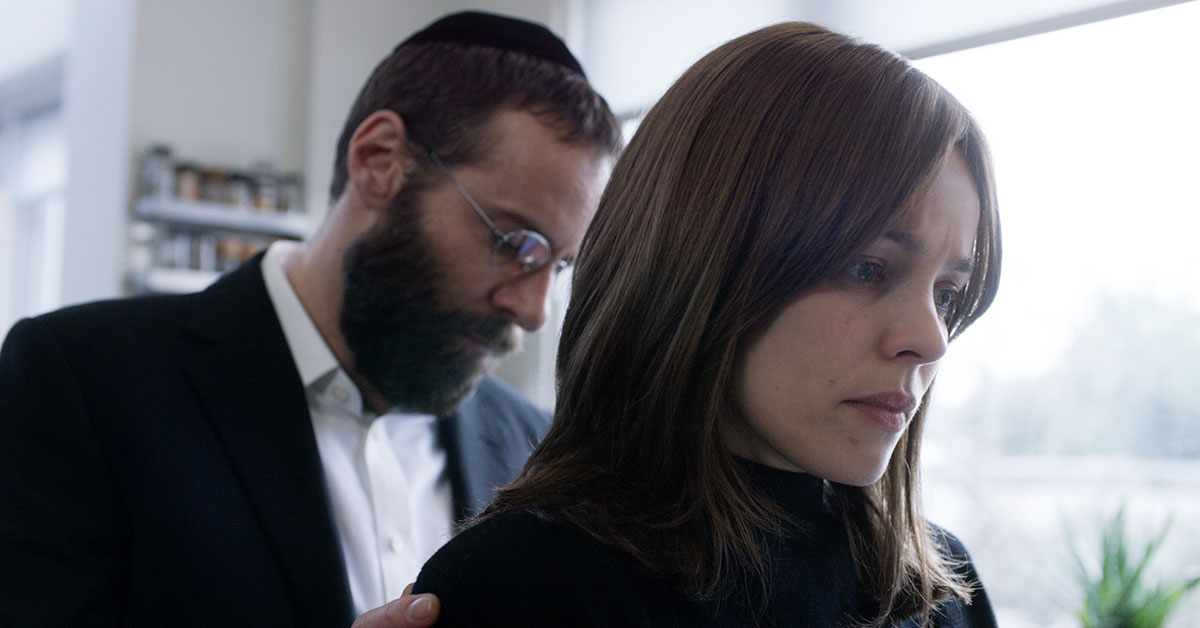When the novel Disobedience came out in 2006, it won author Naomi Alderman a number of Jewish literary awards. It also won her harsh criticism from Orthodox Jews, some of whom responded defensively, while others attacked the quality of the work itself. “There is no real life here,” one Orthodox critic wrote in the Guardian. “Her characters are flattened by the dead weight of meaning each is expected to bear.” She may as well have predicted the film adaptation, in Canadian theatres May 18, which suffers from many of the same plodding problems.
Rachel Weisz stars as Ronit Krushka, a former frum woman living in New York as an artsy photographer. (We know she’s artsy because we meet her while she’s photographing a smiley old man covered in tattoos.) Mid-shoot, she learns that her father, a prominent rabbi back in England, just died. Shaken up, she flies home to the Hasidic enclave of Hendon, just outside of London.
Nobody at Ronit’s old stomping grounds was expecting her and everyone reacts with varying degrees of visible discomfort when she arrives. In particular, her once-close friend Dovid (played by Alessandro Nivola with so much realism that one could honestly believe that the director found some humdrum Orthodox rabbi to play the part) comes off as icy and distant, and we soon find out he married Esti (Rachel McAdams), Ronit’s former best friend and brief lesbian lover from their teenage years.
I’m sure the Orthodox community will take issue with the film’s realism – a more religious critic might be able to spot inconsistencies and cultural inaccuracies. But the bigger concern, I’d argue, is not the film’s portrayal of Orthodoxy, but simply how boring it is. It is a very boring film.
Movies adapted from novels often fail in two ways: they tend to cram too much prose into ham-fisted narration, or they strip away all the internal monologue and rely on the viewers to discern what the actors are expressing, while, onscreen, very little is going on at all.
Disobedience falls into the latter category. But the reflective technique crumbles because so profoundly little happens in the film, and director Sebastián Lelio strings out every moment to a thread. To what end? Why must we watch Ronit staring anxiously into the distance for three seconds? Yes, we get it: she is an uncomfortable outcast in her home. She felt trapped and stripped of her agency by a religion that seemingly invigorates many others. The movie has one single point to make and it makes it so early on that the two-hour runtime becomes a mild form of torture.
Some filmmakers eschew these problems by opting for striking imagery, atmospheric sounds or experimental techniques to instill a certain cinematic mood. Not here. Lelio adamantly keeps things drably realistic, with a staunch commitment to conventional medium-wide shots and natural sounds. The cinematography desaturates everything to the point that most scenes resemble the visual flavour of rancid grey meat. Such realism could have worked, if there was literally anything else engaging about the film.
The plot picks up in moments – a confrontation over Shabbat dinner reminds Ronit of just how restrictive the social rules are in Hendon, as her extended family points out what she can and cannot say, judgmentally digging at the proper way to live a life. Her restrained outbursts indicate one of the few releases of tension in a film that builds up so much, only to deflate.
I suspect some moments will resonate with Orthodox viewers, and anyone outside that world may be able to superimpose their own yearnings for freedom onto the story. The audience feels for McAdams, a terrific Canadian talent, as she struggles to navigate this world. But if you’re still awake by the film’s third and final ending, you may feel a yearning to escape, too.
